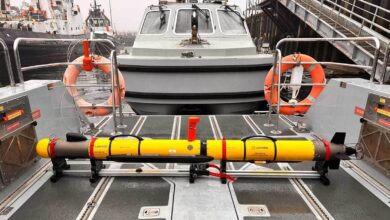The Royal Navy will outfit its Type 26 and Type 31 frigates with the Mark 41 Vertical Launch system, enhancing the warships’ range and lethality.
The frigates, being built by BAE Systems and Babcock International, are expected to enter service by 2025 and 2027.
“We also need to advance our ability to deliver lethal long-range offensive fires against our adversaries,” Navy Lookout quoted Admiral Sir Ben Key as saying at a conference last week.
“Hence the decision to ensure the Mark 41 Vertical Launch Silo is fitted to the Type 26 and, I am delighted to say, we intend to fit it also to our Type 31 frigates.”
Admiral Key added that the Lockheed Martin system will enable the vessels to deploy a range of “current and future anti-air, anti-surface, ballistic missile defense, and strike missiles.”
Will Enhance Navy’s Offensive Capabilities
Naval forces and maritime security expert at the International Institute for Strategic Studies Nick Childs told Forces.Net that the system would allow the navy to improve “its lethality, its offensive missile capabilities – which it’s been criticized in the past for not having enough of.”
“The introduction of the Mk41 missile system will allow them to carry more missiles and to carry a greater number of missiles of different varieties which will improve their firepower.”
“That’ll allow them to defend themselves and, if necessary, pose problems to the enemy in ways that they couldn’t in the past.”
Vertical Launch System
The Lockheed Martin system can deploy anti-aircraft, anti-surface, anti-submarine, ballistic missile defense, and land attack missiles.
The system comes in 13 configurations — ranging from a single module with eight cells to 16 modules with 122 cells.
The system’s weapon control interface and the missile’s mechanical and electrical interface feature open architecture, allowing the system to support any missile in any cell and easy integration of future technologies.











